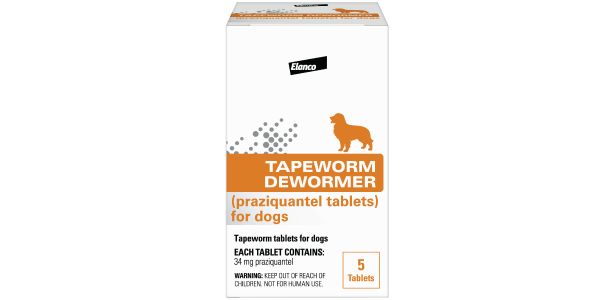The process of deworming your dog.
Dogs are curious animals, and they encounter much of the world with their noses and mouths. Unfortunately, this means intestinal worms are a common and constant threat. If you’ve discovered evidence of worms in your dog, using a deworming treatment can quickly and effectively address the problem.
Many options are available to help you treat and control worms in your dog; the most common are tablets and spot-on treatments. Once you’ve found the right product for your dog, administering the treatment is usually straightforward. But what happens after you’ve treated your dog for worms? Here’s what to expect in the first hours and days after deworming.
The First Few Hours after a Deworming Treatment
It’s a good idea to deworm your pet at home where they are comfortable. If possible, choose a quiet weekend so your pet is calm and relaxed — not stressed or excited by a lot of commotion — and so you will have time to monitor your dog after administering the deworming treatment.
Deworming your dog is a relatively simple process, much like giving your pet a treat. In fact, if you use a tablet-based deworming treatment, it can be helpful to hide the pill in a treat like cheese, peanut butter, turkey or wet food to help make sure your dog completely swallows the tablet. Some tablets are already flavored to taste like a treat to your pet, so they may not need to be hidden in food. However, some dogs may try to spit out a tablet immediately or even several minutes after you give it to them — even if it’s flavored — so disguising the pill as a treat can make the process easier for you and your dog.
As with any oral medication, dogs can occasionally vomit shortly after taking the dose. If your pet is a puppy or has a habit of eating food or drinking water too quickly and getting sick, monitor them for vomiting for two to three hours after administering the deworming tablet.
If your dog vomits the tablet whole, wait a little bit for them to calm down and then re-administer the pill. If the tablet is partially digested or not visible at all, contact your veterinarian to get a new dose. If your dog hates pills and knows all your tricks, there are also topical deworming products available.
Regardless of what kind of deworming product you use, the treatment will typically begin working within a few hours and your dog will most likely behave as normal.
The Deworming Process after a Few Days
Depending on what kind of worms your dog has, you may or may not see worms in their stool in the days following a deworming treatment. Most deworming products treat roundworms, hookworms and whipworms by paralyzing and killing the parasites; tapeworms are killed and broken up into smaller segments. Some intestinal worms, like hookworms and whipworms, are so small that you won’t see any worms in your dog’s stool at all.
You may be surprised to still see live worms in your dog’s feces after deworming them, but this is normal. While this can be an unpleasant image, it’s actually a good thing — it means the worms are no longer living inside your dog! Additionally, you may see dead worms in your dog’s stool for a few days following treatment, or your dog may have diarrhea as they digest the dead worms. Most of the time, regardless of what you see in their stool, recently dewormed dogs behave like normal.
Puppies and other dogs may require repeat deworming treatments a few weeks after their initial treatment. This is often based on the type of worm and product used. For questions about a deworming schedule for your dog, speak to your veterinarian.
Why Should I Deworm My Dog?
While worms rarely cause serious health problems, they can leave your dog feeling less than their best. This is because intestinal worms live in your dog’s intestinal tract, feeding on their blood and nutrients. Symptoms of worms include scooting, a dull coat, weight loss, low energy and diarrhea. Young puppies are most at risk and left untreated, a serious worm infection can lead to anemia, malnourishment, intestinal blockage and even death in severe cases.
Some worms, such as roundworms (also known as Toxocara), can be passed onto humans. Toxocara can cause serious issues, particularly for children. Luckily, regular dog deworming can help protect your pet and your family. It’s easy to do and it is the best way to keep worms at bay.
Did You Know?
If your dog has freshly passed feces, it’s not usually a Toxocara hazard. While roundworm eggs are normally present in the feces of infected dogs, the eggs take approximately two weeks to mature before becoming infectious. This is why it’s important to clean up after your dog quickly and dispose of the feces properly.
Establishing a Plan for the Future
Unfortunately, even when your pup has been fully dewormed, the risk of becoming infected again will continue. The best way to protect your dog from intestinal worms is to have them on a monthly heartworm prevention product that also treats and controls common intestinal worms. These products are safe, effective and available in an easy-to-apply topical solution or pill.

Drontal® Plus (praziquantel/pyrantel pamoate/febantel)
Drontal® Plus is a safe and effective way to treat and control the most common intestinal worms in dogs. Available with a veterinarian's prescription.

Quad Dewormer (praziquantel/pyrantel pamoate/febantel) for Dogs
Nonprescription broad-spectrum dewormer that is effective against tapeworms, roundworms, hookworms and whipworms. Not for human use. Keep out of reach of children.

Tapeworm Dewormer (praziquantel tablets) for Dogs
An easy and effective way to remove common tapeworms from dogs. Not for human use. Keep out of reach of children.
Drontal® Plus (praziquantel/pyrantel pamoate/febantel) for Dogs
Indications:
Drontal Plus: This drug is indicated for removal of Tapeworms (Dipylidium caninum, Taenia pisiformis, Echinococcus granulosus, and removal and control of Echinococcus multilocularis). For removal of Hookworms (Ancylostoma caninum, Uncinaria stenocephala), Ascarids (Toxocara canis, Toxascaris leonina), and Whipworms (Trichuris vulpis) in dogs.
Important Safety Information:
Drontal Plus: CAUTION: Federal (U.S.A.) law restricts this drug to use by or on the order of a licensed veterinarian. DOSAGE: Not for use in puppies less than 3 weeks of age or weighing less than 2 lbs. CONTRAINDICATIONS: Do not use in pregnant animals. WARNING: Keep out of reach of children. For full safety information, see product label for tablets or product label for taste tabs.
Quad Dewormer (praziquantel/pyrantel pamoate/febantel) Chewable Tablets for Dogs
USES:
Quad Dewormer (praziquantel/pyrantel pamoate/febantel) Chewable Tablets for Dogs will remove common tapeworms (Diplydium caninum and Taenia pisiformis), remove common hookworms (Anclostoma caninum, Unicaria stenocephala), remove common roundworms (Toxocara canis and Toxascaris leonine) and remove whipworms in dogs (Trichuris vulpis).
Important Safety Information:
Consult your veterinarian for assistance in the diagnosis, treatment and control of parasitism; consult your veterinarian before administering the tablets to weak or debilitated animals; do not deworm a dog or puppy that is sick; consult your veterinarian for diagnosis of the illness and appropriate care. Not for use in puppies that are younger than 3 weeks of age or dogs weighing less than 2 lbs. May be given directly in the mouth or offered in a small amount of food. WARNING: Keep out of reach of children.
For complete directions for use and safety information see product label.
Tapeworm Dewormer (praziquantel tablets) for Dogs
USES:
TAPEWORM DEWORMER (praziquantel tablets) FOR DOGS will remove the common tapeworms, Dipylidium caninum and Taenia pisiformis, from dogs and puppies.
Important Safety Information:
WARNING: Keep out of reach of children. Not for human use.
Not intended for use in puppies less than four (4) weeks of age. For complete directions for use and safety information see product label.




